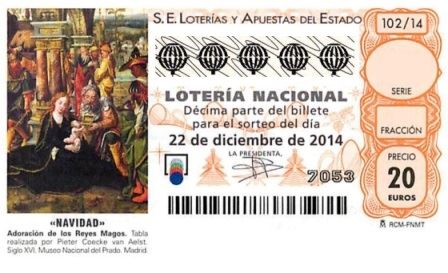Luck has become Región de Murcia in one of the luckiest Communities in Spain due to the Christmas National Lottery 2014. But, are you aware of the tax implications to earn money with lottery tickets?
We have asked to the expert in tax law Mr. Isaac Abad, a lawyer and economist representing the Law Firm Abad Abogados, which are his recommendations regarding the collection of earned money in lottery tickets in Christmas Lottery 2014.

It is interesting to earn the money before the New Tax Law comes into force?
This is one of the most worrying issues for those who has earned money with the lottery.
To be honest, it is indifferent, due to the fact that it is a right of collection, so it must be consigned in the Patrimony tax of 2014 from the day you earn that money. The income from liquid capital, which have been got these days, will pay tributes a little bit higher, reason why it is better to contract products whose interest deployment takes place in the year 2015.
Which is the taxation of these prizes?
In December 2013, the awarded lottery tickets, were for the first time taxable, and for 2014, continues the same. Nevertheless, this only affects to those amounts over 2.500€. If the amount is under 2500€ the gain will be tax exempted.
From that amount, lottery prizes tribute 20%, which means that those who have been lucky, receive directly 80% of the amount of the prize, due to the fact that the National Lottery is obliged to retain 20% and deposit it in the Tax Agency.
What happens when the décimo is shared between different people?
When the awarded lottery ticket has been bought and shared between various people, the exemption limit of 2500€ is applied to those who bet, and moreover for every prize. It means, that if a lucky person has several lottery tickets, the exempt limit applies to each of them. It is advisable, therefore, that the prize is received by every lucky person individually, because if one person gets all and after give it to the others, it would be additionally subject to the Donation Tax.
And if the owner of the décimo is a Company?
In this case, the exempt minimum is not applied and the prize must be added to the taxable base of the Companies Tax. Due to the fact that décimos are to the bearers, it would be advisable that before you get the money, you contact a tax specialist to study the special circumstances regarding the case.
Which is the deadline to collect the awarded lottery tickets?
There are 3 months, from the following day after the Christmas Lottery.
Where can you get the money?
For prizes under 2500€ in the own Lottery Administrations. For prizes over 2500€ you should go to the official financial entities.
And if I have a participation, where should I collect the money?
The payment of the participations in décimos must be done at the emitting entity, you cannot go neither to the Lottery Administrations nor to financial entities.
What is your advice to those who have earned money with lottery tickets?
I certainly recommend them to contact with experts in tax law, due to the fact that taking the right decisions in tax planning will mean an important saving. In our case, we have one office in Mazarrón, where we will be happy to attend to all those who need support.
Further information about tax in Spain at: www.abadabogados.com